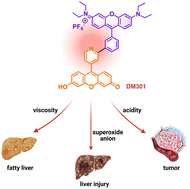Abnormal viscosity, reduced pH, and elevated levels of superoxide anion (O2˙−) in living cells are often associated with various biological dysfunctions and oxidative stress. Although some studies have reported probes capable of detecting one or two of these biomarkers, achieving simultaneous, rapid, and convenient detection of all three remains a significant challenge. Herein, we present a rhodamine based probe, DM301, which selectively activates fluorescence in three distinct channels in response to pH, viscosity, and O2˙− respectively. Systematic spectroscopic analyses demonstrated DM301‘s exceptional response to these biomarkers, while in vitro experiments confirmed its mitochondrial specificity at the cellular level. To validate the diagnostic potential of DM301, we employed various disease models, including 4T1 tumors, fatty liver, and drug-induced liver injury, all associated with these abnormal biomarkers. In vivo, experiments further established the safety of DM301 and demonstrated its specificity to pH, viscosity, and O2˙− across different pathological conditions in living organisms. We anticipate that these findings will offer practical and effective strategies for investigating the physiological roles of biomarkers and analytes in diverse biological systems.
